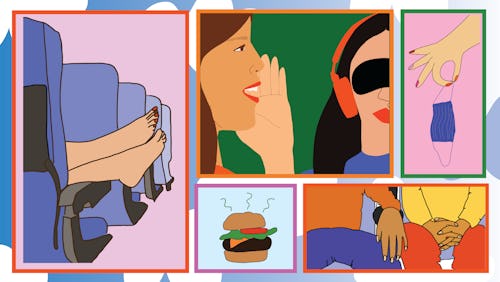This holiday season is going to be a thunderdome of travel anxiety
A therapist offers some strategies to help you cope.

The holiday season is officially upon us. Especially now that travel poses little risk to fully vaccinated people, many of us welcome the opportunity to hop in a car or on a flight to reunite with friends and family. Those who live with travel anxiety, though — not so much. Throw in the grim reality that the coronavirus is still in our midst, and you have all the makings of a full-blown anxiety cocktail. Here’s why your travel anxiety it might be, er, special, this year, and how to deal.
First of all, while traveling can stress anyone out, there is a difference between regular travel stress and travel anxiety. With the latter, you feel so overwhelmed with the preparations and the trip itself — everything from airport crowds to flying itself — that “it interferes with your ability to travel,” says Estepha Francisque, a therapist in Oakland, California. “You might find it hard to make those arrangements or actually follow through on them.” To others, this might look like procrastination or flakiness when it’s really anxiety, fear, or uneasiness.
Travel anxiety can stem from things you’ve heard or seen regarding travel, “or just the brain going through all the things that can go wrong,” whether a plane crash or losing your passport, according to Francisque. A fear of flying — “some of the most common travel anxiety that we see,” he says — might’ve started with being on a plane that flew through intense turbulence or that made a sketchy landing. Experiences like this can impress a trauma signature on people, he notes, imprinting them with the idea that “when we travel, things can go wrong, and I’ve experienced it, so it’s no longer just a remote possibility.”
Because travel anxiety isn’t listed in the Diagnostic and Statistical Manual of Mental Disorders (DSM-5), which clinicians use to diagnose mental health conditions, we don’t know how prevalent it is. But because nearly 30% of adults experience an anxiety disorder during their lifetimes, according to the American Psychiatric Association, Francisque predicts that it’s pretty common.
What is clear is that if you struggle with travel anxiety, COVID has probably made matters worse. Now, you might also have to grapple with a fear of contracting COVID, Francisque says, or testing positive right before your return trip, leaving you stranded in an unfamiliar place. “If you’re already prone to anxiety, or travel anxiety specifically, there’s a lot more you could potentially worry about,” he tells Mic.
You might experience more intense anxiety, he says, to the point that you might delay your travel or cancel it altogether. He’s noticed that those with COVID travel anxiety have coped by putting off travel to see loved ones, citing worries about contracting or spreading the disease. But that card might be harder to play this holiday season, especially if you and your loved ones have gotten your COVID shots, or even boosters.
The good news is, there are strategies you can implement to manage your travel anxiety. Francisque suggests doing everything within your control to lower your odds of getting COVID, whether that means getting vaccinated and/or taking precautions like wearing an N95 mask.
You could also try a method that Francisque practices with his clients whenever they have an upcoming event they expect to bring up a lot of emotions, called “coping ahead.” It involves first imagining the absolute worst-case scenario, then picturing yourself coping with it in a healthy or appropriate way. For example, if you fear losing your passport and getting stranded, know that you can contact the U.S. embassy at your destination. Repeat for the best-case scenario and something in-between (which is probably the more likely outcome).
“We often find that feeling prepared, rehearsing all the scenarios and how we would deal with them, often reduces that feeling of anxiety because a lot of anxiety is borne from uncertainty and not knowing what’s going to happen,” Francisque says. Think of it like studying for a test. You don’t know what questions you’ll get, but the mere fact that you practiced can deliver a major confidence boost.
While it’s possible to manage travel anxiety on your own, Francisque suggests reaching out to a mental health professional if it disrupts your ability to live your life. That might look like avoiding travel to a major family event, or to a work function, even it would mean adversely impacting your employment. Or maybe you do travel, but experience panic attacks. As cheery as the holidays are supposed to be, you don’t have to smile through your travel anxiety, nor do you have to navigate it alone.